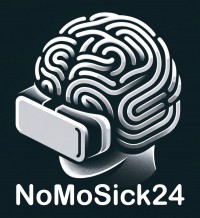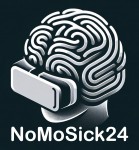
1st International Workshop on Standardization in Cybersickness Research:
“Establishing Standards for Cybersickness Measurement and Mitigation: A Community-Driven Approach”
Date & time: Monday morning 8am-noon, 21 October 2024 at ISMAR 2024
Location: Redmond room, see ISMAR schedule
Join remotely using this Zoom link or check on the ISMAR website for updates (contact us if you don’t receive it).
Catering to a diverse audience and facilitating in-depth discussions, the workshop will feature breakout sessions focused on specific areas of interest within cybersickness research. Participants can choose the session that aligns most closely with their expertise and interests. The breakout sessions will cover the following key research issues (depending on the number of participants and their interests):
- Measurement and Metrics: Defining standardized metrics for quantifying cybersickness, exploring the strengths and weaknesses of subjective vs. objective measures and existing questionnaires and existing questionnaires, and discussing the challenges of ensuring consistency and comparability across different studies and systems.
- Mitigation Strategies and Best Practices: Evaluating the effectiveness of various cybersickness cybersickness mitigation techniques, from hardware and software optimizations to user adaptation and potential (non)pharmaceutical interventions, and identifying best practices for integrating these strategies into VR experiences.
- User Experience and Individual Differences: Understanding the impact of cybersickness on user experience, exploring individual differences in susceptibility, and discussing strategies for designing inclusive and accessible VR experiences.
- Emerging Technologies and Future Directions: Investigating the potential of new technologies like eye-tracking, haptic feedback, and AI in mitigating cybersickness, while also identifying future challenges and opportunities as while also identifying future challenges and opportunities as VR technology continues to continues to evolve.
- Challenges and Opportunities in Standardization: Identifying key obstacles to establishing standardized approaches, exploring strategies for building consensus, and outlining the potential benefits of standardization for research, development, user safety, and ethical considerations, and ethical considerations.
- Using and Adapting the VR Sickness Benchmark: Discussing the applications of a novel open source VR sickness benchmark system for assessing and comparing VR experiences„mitigation techniques and contributing factors and contributing factors, as well as exploring opportunities for its further development and validation.
Cybersickness remains a major obstacle to the wider adoption and effective utilization of VR technology. By addressing this critical issue, the workshop contributes to the advancement of VR research and development, ultimately improving the user experience and expanding the potential applications of VR in various domains, including entertainment, education, healthcare, and industry.
Workshop organizers
- Bernhard E. Riecke, Simon Fraser University
- Ernst Kruijff, Hochschule Bonn-Rhein-Sieg
- Behrang Keshavarz, KITE Research Institute (UHN) / Toronto Metropolitan University
- Rose Rouhani, Simon Fraser University
Thanks for additional help & support by Kenneth Karthik and Katharina Pöhlmann
Workshop paper
Sorry, there’s no items to display.
Draft agenda
The workshop will be conducted in a hybrid format, accommodating both in-person and virtual attendees.
8:00 AM - 8:20 AM: Opening Session (Plenary)
- Welcome and Introduction
- Overview of Workshop Agenda and Logistics
8:20 AM - 8:50 AM: Keynote Presentation
by Stephen Palmisano on “The importance of replication when investigating the origins of cybersickness.”
Biography: Stephen Palmisano is a Professor of Psychology at the University of Wollongong in Australia. He is internationally recognized as an expert on illusions of self-motion and motion sickness — with over 30 years experience studying both phenomena. Stephen was awarded his PhD (on visual self-motion perception) from the University of New South Wales in 1997. He then worked for several years on stereoscopic vision and multisensory perceptions of self-orientation at York University in Canada. On his return to Australia, Stephen established his Perception and Action Laboratory (PAL) in 2000. Over the years, PAL has developed, mentored, and hosted, many high profile perception and virtual reality (VR) researchers. Most of the research in PAL is currently focused on understanding the cybersickness caused by head-mounted displays (HMDs). As a keen gamer, Stephen is particularly interested in the sickness experienced when playing video games in HMD VR. He is currently an editorial board member for the journal Vision, and an associate editor for the journal Frontiers in Virtual Reality.
8:50 AM - 9:00 AM: VR Sickness Benchmark System
- Brief Overview: Introduction to a novel VR sickness benchmark system, positioning it as one tool among many for measuring and mitigating VR sickness (with a quick demo if possible, see our afternoon Cybersickness Benchmarking Tutorial for a in-depth overview and demo)
9:00 AM - 9:40 AM: Lightning Talks
- 5-minute presentations by participants showcasing their research, tools, or ideas related to the workshop foci. See call for lighting talks below
9:40 AM - 10:30 AM: Networking, Demo & Unconference Session
- Networking: Informal discussions, exchange of contact information, and potential collaborations.
- Demos: Participants showcase their work, including the VR sickness benchmark system.
- Unconference: Participant-led discussions on self-organized topics.
10:30 AM - 11:10 AM: Interactive Sessions (Breakout Groups)
- Participants self-select into groups based on their interests, focusing on one of the following topics:
- Measurement and Metrics
- Mitigation Strategies and Best Practices
- User Experience and Individual Differences
- Emerging Technologies and Future Directions
- Challenges and Opportunities in cybersickness Standardization
- Using and Adapting the VR Sickness Benchmark
- Note: The workshop including the breakout sessions will be organized using an online whiteboard (Miro) to streamline workshop organization, discussion and presentation of results. Each breakout group will have a designated moderator and select a note-taker/presenter.
11:10 AM - 12:00 PM: Synthesis Session (Plenary)
- Breakout group reports: Each group presents a summary of their key findings, insights, and recommendations.
- Open discussion and Q&A: Broader conversation about the workshop themes and emerging ideas, integrating insights from the unconference session.
- Closing Remarks: Summary of key takeaways and next steps, emphasizing the importance of continued collaboration and community building.
Interested in using/adapting the VR benchmark system? Please feel free to contact Bernhard Riecke at ber1@sfu.ca if you’re interested in getting early access to the VR benchmark system and data analysis toolkit (see http://ispace.iat.sfu.ca/project/vr-sickness-benchmark/) for your research, and potentially contributing to a joint review paper.
Call for Lightning Talks at ISMAR 2024: Establishing Standards for Cybersickness Measurement and Mitigation: A Community-Driven Approach
Share Your Insights and Shape the Future of Cybersickness Research!
We invite researchers, developers, and practitioners to submit proposals for lightning talks (5 minutes) at the upcoming workshop, “Establishing Standards for Cybersickness Measurement and Mitigation: A Community-Driven Approach,” at ISMAR 2024.
Topics of Interest:
Lightning talks should address one or more of the following key research areas:
- Measurement and Metrics: How can we define and standardize objective and subjective measures for quantifying cybersickness?
- Mitigation Strategies: What are the most effective hardware, software, and behavioral techniques for reducing cybersickness?
- User Experience: How does cybersickness impact user experience, and how can we design more comfortable and accessible VR environments?
- Individual Differences: What factors contribute to individual variations in susceptibility to cybersickness, and how can we personalize mitigation strategies?
- Emerging Technologies: How can new technologies like eye-tracking, haptic feedback, and AI be leveraged to address cybersickness?
- Standardization Challenges and Opportunities: What are the key obstacles and potential benefits of establishing standardized approaches for cybersickness assessment and mitigation?
- The VR Sickness Benchmark: How can this tool be utilized or adapted to advance research and development in this field?
Submission Guidelines:
- Please submit a title and brief abstract (max. 250 words) outlining your proposed lightning talk using this form.
- Clearly indicate which topic(s) of interest (see previous list) your talk will address.
- The deadline for submission is September 2, 2024.
- Selected presenters will be notified by September 9,2024.
Note: Talk abstracts will be published on our workshop website, but will not be published in the IEEE Digital Library.
Why Participate:
- Share your research and insights with a diverse audience of experts and stakeholders.
- Contribute to the development of standardized approaches for cybersickness assessment and mitigation.
- Network with colleagues and potential collaborators in the field.
- Help shape the future of VR well-being and user experience.
We look forward to receiving your submissions and engaging in a productive discussion at the workshop.
Call for Demos at ISMAR 2024: Establishing Standards for Cybersickness Measurement and Mitigation: A Community-Driven Approach
Showcase Your Work, Spark Collaboration, and Drive Innovation!
As part of the upcoming “Establishing Standards for Cybersickness Measurement and Mitigation: A Community-Driven Approach” at ISMAR 2024, we invite you to submit a demo for our dedicated “Networking, Demo & Unconference Session” (see draft schedule above). This is your chance to informally share your innovative research, tools, or experiences related to cybersickness measurement, mitigation, or user experience.
We welcome a wide range of demo formats, including:
- Full VR demos: Immersive experiences showcasing your latest VR technology or research findings.
- Interactive demos: Hands-on demonstrations of tools, software, or hardware related to cybersickness.
- Video demos: Concise video presentations of your work, ideal for virtual participants.
Whether you’re a researcher, developer, or professional interested in VR well-being, we encourage you to share your work and contribute to the conversation. Your demo could spark new ideas, foster collaboration, and drive innovation in the field of cybersickness standardization.
Submission Guidelines:
- Please submit a brief description of your demo (max. 250 words) outlining its purpose, key features, and relevance to the workshop themes using this form. Please include visuals.
- Include your preferred demo format (full VR, interactive, or video) and any technical requirements.
- If your demo requires specific equipment or software, please ensure that you can provide/organize it yourself.
- Selected demos will be showcased during the “Networking, Demo & Unconference Session” at the workshop.
Note: Demo abstracts will be published on our workshop website, but will not be published in the IEEE Digital Library.
Why Participate:
- Showcase your work: Gain visibility for your research or development efforts.
- Receive feedback: Get valuable insights from fellow researchers and experts in the field.
- Connect and collaborate: Network with potential collaborators and expert partners.
- Contribute to innovation: Help drive progress in cybersickness standardization.
Don’t miss this opportunity to share your expertise and contribute to a vibrant community working towards a safer and more comfortable VR experience for all.
- The deadline for submission is September 2, 2024.
- Selected demo presenters will be notified by September 9, 2024.
We look forward to seeing your exciting demos!
